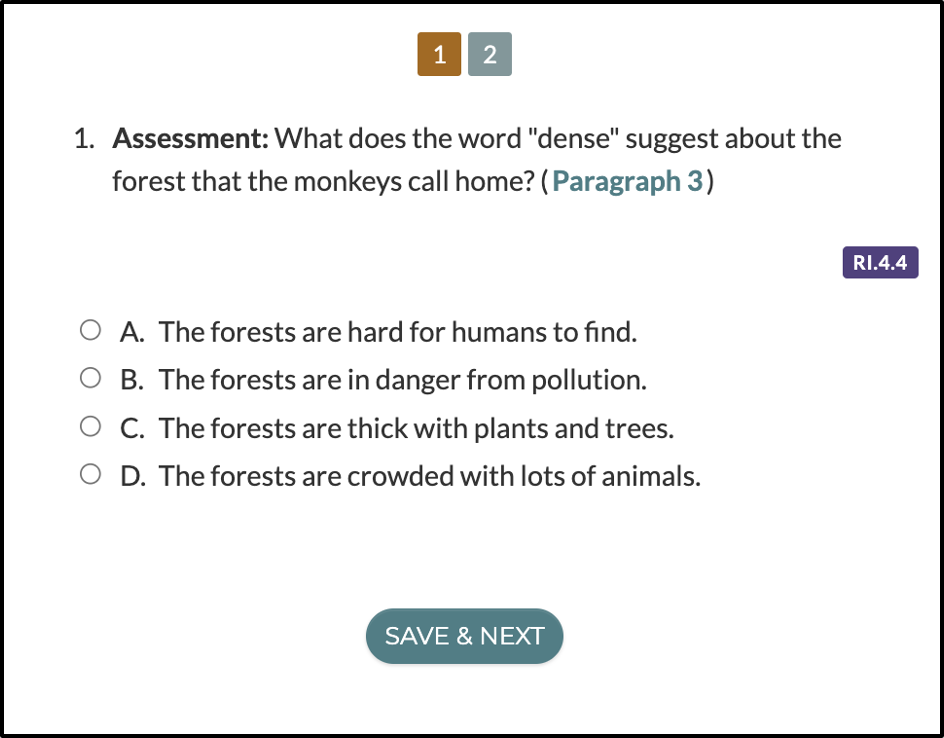 Target Lessons
Improve Reading Comprehension and Track Formative Data with Target Lessons
Target Lessons
Improve Reading Comprehension and Track Formative Data with Target Lessons
With CommonLit’s Target Lessons, students develop critical and transferable reading skills while educators seamlessly track formative skill-based data.
When students master high-leverage and transferable reading skills, it makes it possible for them to make dramatic reading growth (National Institute of Child Health and Human Development, 2000).
This is why CommonLit recently released our newest product, Target Lessons. Target Lessons are short, easy-to-use, and highly engaging lessons that focus on a specific reading comprehension skill. We’ve built these lessons around the skills and standards that are frequently assessed on statewide assessments. These lessons are ideal for both struggling readers and proficient readers who are just bolstering their skills.
Each lesson comes complete with a high-quality text, a hook to engage readers, skills-based instruction, scaffolded questions to build students’ skills, and assessment questions to track students’ progress. While teachers can track formative data from Target Lessons, schools can unlock access to CommonLit comprehensive data tracking program when they purchase School Essentials PRO.
In this blog post, I’ll tell you everything you need to know about Target Lessons and how your school or district can use them to track student progress on key reading comprehension skills.
How to Access Target Lessons
CommonLit’s Target Lessons are easily accessible. We currently offer dozens of lessons that can be found in our digital library.

Within the library, teachers can browse or filter to find the grade level and skill focus that is right for their students.
Currently, we offer lessons that focus on high-priority skills such as identifying evidence to support a claim, identifying main ideas, analyzing cause and effect, analyzing author’s word choice, and analyzing the author’s point of view. In the coming months, we’ll be adding hundreds of additional Target Lessons that focus on additional high-leverage skills.
How Target Lessons Build Reading Comprehension Skills
Target Lessons are complete lessons that have been carefully designed by CommonLit’s team of instructional designers.
Let’s take a look at a 4th grade lesson that focuses on finding the meaning of unknown words in context. This lesson leverages the text, “Monkey Talk,” a fun and informative text about how monkeys communicate with one another.
The Hook
As educators, we know that every great lesson begins with a quick and exciting hook. This particular lesson begins with a quick image exploration. Students review several images and facts about monkeys before answering some probing questions.

With this quick hook, students are building background knowledge and interest in the day’s lesson.
Direct Skill instruction
After the hook, students watch a short video that highlights some key strategies for tackling the lesson’s skill.
In this video, one of CommonLit’s instructional experts defines the skill in student-friendly language, explains in practical terms why it’s a really important skill to build, and then leads an effective read-aloud where they model the skill in action.
Building Skills Through Scaffolded and Targeted Questioning
Now that students are excited to learn more about the topic and they understand how to tackle the lesson’s focus skill, we’re ready to begin reading the text.
As students begin reading the text, they’ll encounter scaffolded comprehension questions that are carefully designed to give them practice with the lesson’s target skill.

Typically, Target Lessons begin with a multiple choice question. They’re designed to give students quick feedback as they’re practicing this new skill. Before long though, we transition to open-ended questions. These give students the chance to practice their writing skills and to showcase their comprehension of the text. These questions are also a way for teachers to probe student thinking and build class discussion.
Collecting Formative Data
After students complete the During Reading questions, they have a final opportunity to demonstrate their proficiency with target skill.

Lessons typically culminate with 2-3 standards-aligned questions. These include a combination of multiple choice and open-ended response questions.
These questions present educators with a great opportunity to collect critical and meaningful formative data.
Analyzing Student Data Across Your School or District
After students complete a Target Lesson, teachers can quickly and easily analyze and grade student work. Teachers have access to easy-to-use dashboards where they're able to quickly identify struggling readers that need additional support. Teachers can also see how students are scoring on specific standards.

Next Steps
If you and your team are interested in Target Lessons and want to learning more about how they can support student skill-building, email us at partnerships@commonlit.org
Or, if your team is ready to roll out CommonLit’s full instructional program and want to unlock CommonLit’s full data tracking program for schools, request a quote here.

